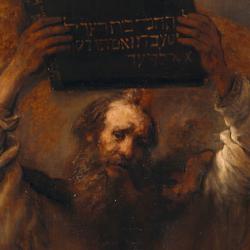Israel has been in the wilderness for three months when they arrive at Sinai (Exodus 19:1). Behind them are the ruins of Egypt, devastated by plagues. They have passed through the sea, received manna and water in the wilderness. They have grumbled and rebelled. And now they come to the mount of God. The God who unveiled His name to Moses on this mountain is about to unveil Himself to Israel.
It’s the third month, and the third day of the month (19:16). Yahweh descends in a thick cloud onto the mountain with the sound of a trumpet blast that summons Israel to assembly. The Lord speaks from the cloud with a voice like thunder: “I am Yahweh your God, who brought you out of the land of Egypt, out of the house of slavery.”
He speaks what the Bible calls the “Ten Words” (Exodus 34:28; Deuteronomy 4:13).
He has spoken ten times before. Ten times Genesis 1 says “And Elohim spoke.” Now from Sinai, “Elohim” the Creator again speaks ten words.
He has spoken on the third day before: On the original third day, in His seventh of ten creation words, Yahweh called on the land (eretz) to bring forth (yatza’) grass yielding seed and trees yielding fruit (Genesis 1:11). (On the sixth day, Elohim also brings [yatza’] animals from the land [eretz], Genesis 1:24.)
As Yahweh begins speaking from Sinai, He reminds Israel that he brought them (yatza’) from the land (eretz) of Egypt. During the third month, Israel will later celebrate Pentecost, the Feast of weeks, a celebration of the firstfruits of the harvest. Here at the first Pentecost, Israel is the firstfruits, the people of grain and grapes, of bread and wine, the first to rise from the land on the third day.
Elohim speaks Israel to become a new creation, His treasured possession, a royal priesthood among the nations. He cuts covenant to bring Israel into a unique relationship with Himself, and to teaches them how to live justly with one another. God speaks so that this vine brought from Egypt (Psalm 80; Isaiah 5) will produce fruit.
To whom is Yahweh speaking? When Israel arrives at Sinai Yahweh speaks directly to Moses. He calls Moses (19:3, 20) and speaks to Moses (19:9, 10, 21, 24). Six times he addresses Moses and Moses relays His messages to Israel. After the Ten Words, Moses again goes up into the cloud to receive the Lord’s word and relay it to the people (20:21-22).
But the Ten Words are different. Moses is at the foot of Sinai with the people (19:25) when God speaks (20:1). On the third day of the third month, God speaks a seventh time, and addresses not the mediator Moses but all Israel (cf. 20:18; His eighth speech, to Moses, includes the “case laws,” 20:22—23:33). Among all the words that Yahweh speaks at Sinai, the Ten Words are alone unmediated, spoken to people who have been brought from the land.
But there’s a grammatical difficulty. God speaks to all the people, but the commandments are in the masculine singular of the second person. The KJV gets it right: “Thou shalt have no other gods before Me”; “Thou shalt not kill”; “Thou shalt not steal.” It’s as if God were saying, “You man, I brought you out of slavery. You man, don’t have any other gods, or images. You man, don’t kill, steal, commit adultery, or covet.”
It’s possible that God speaks this way to emphasize that every individual Israelite has to keep these laws. These aren’t simply collective rules for the nation but apply to individual conduct.
It’s also possible that God is addressing these words to Israelite men in particular. They’re the ones who labor and rule a house so they can give rest. They are the ones who are forbidden to desire their neighbor’s wife. Commands are given to the elders of Israel, who are the ones who mediate God’s Words to the rest of the people.
I think something else is going on. Who has been delivered from Egypt? Who has been rescued from the house of bondage? Israel, of course, but Israel as the son of Yahweh (Exodus 4:23). This is the legal basis for Yahweh’s demand to Pharaoh: Israel is My son; you’ve enslaved My son, but you have no right to My son; let My son go. When Pharaoh refuses, Yahweh takes up the role of a kinsman redeemer and forces the issue. With a mighty hand and outstretched arm, He brings His son from Egypt.
God’s first command was given to His son, Adam. Now He speaks to His new-Adamic son, Israel.
Sinai is a Father-son talk, like the wisdom of the Proverbs. As such, it’s a self-revealing talk. Yahweh the Father of Israel discloses His likes and dislikes to His son. The Ten Words tell Israel how to live, but they are just as much “a personal declaration by YHWH” (Edward Greenstein).
The Ten Words are house rules of Yahweh. They teach Israel how to resemble his Father. Every Israelite is to renounce idolatry, keep Sabbath, honor parents, reject murder, sexual immorality, theft, and evil desires.
Israel the son, Israel as a corporate son of the divine Father, is to take on His divine character. Corporately, Israel is to be a people without idols, a rest-giving people, a people respectful of ancestors, not a people characterized by violence, theft, sexual sin, lies.
Yahweh speaks to Israel his son not as God-in-general, not as the Creator of the universe. He identifies Himself to His son Israel as “Yahweh,” who is “thy God.”
The name Yahweh is mysterious. When Yahweh reveals His name to Moses from the burning bush (Exodus 3), He first calls Himself “I am who I am.” That translation too simple. The Hebrew verbs could be any tense: “I will be who I will be; I am who I will be; I will be who I was” (Victor Hamilton).
The context clarifies. Yahweh is the God who sees Israel’s affliction and hears his cry. He’s the God who comes down to deliver and to bring them out of the house of slavery. Yahweh is the God who will be everything that Israel needs, who will do everything that Israel needs done. He will always be for Israel.
To say that God is Yahweh is to say that He is Israel’s God, the God of Abraham, Isaac, and Jacob, the God who makes and keeps promises to specific people, to a specific people. To say that God is Yahweh is to say that He is “thy God,” God to Israel his son.











